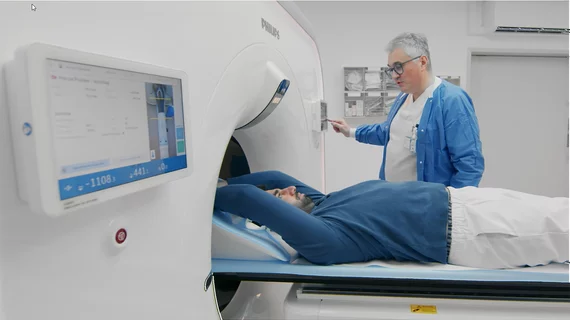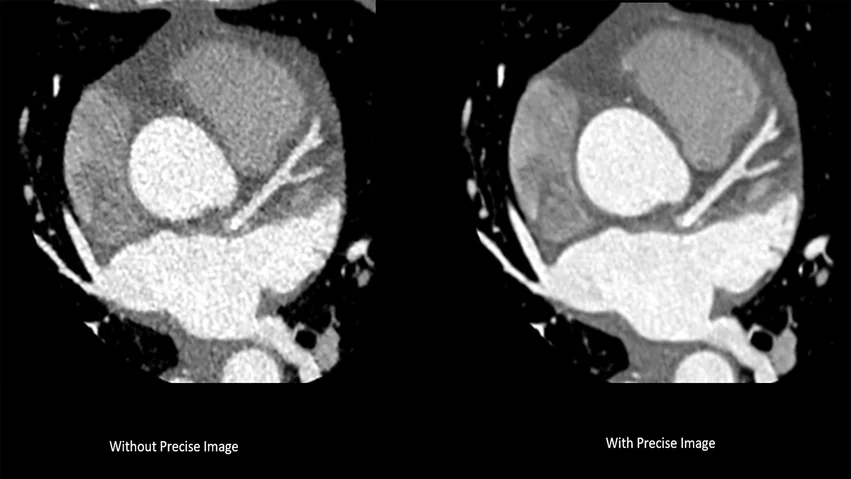Philips launches new AI-enabled CT scanner aimed at cardiology at ECR 2024
Philips Healthcare introduced a new computed tomography system this week at the European Congress of Radiology (ECR) aimed at the rapidly growing cardiac coronary CT angiography (CCTA) market. It features a new detector that was designed to optimize the use of artificial intelligence (AI) image reconstruction algorithms.
The new CT 5300 system provides more accurate and reliable imaging results to better manage the increase in complex cardiac cases. Philips said it's equipped with advanced AI capabilities designed to be used for diagnosis, interventional procedures and screening. The AI features, including its new detector, automated patient isocentering on the table and other features, helps streamline workflow efficiency to improve patient outcomes and department productivity. The AI features are aimed at improving patient throughput in short-staffed radiology departments as the shortage of radiologists and technologists continues to grow.
“We’ve leveraged AI in virtually every aspect of CT 5300, freeing both CT technicians and radiologists from tedious, time-consuming tasks so they can spend more time focused on their patients,” explained Frans Venker, business leader of CT at Philips, in a statement. "We listened to radiologists about the issues they face every day and what they wanted out of a next-generation CT system. We then combined the latest imaging and AI technologies to meet their needs."
The system also integrates virtual tools for real-time collaboration and clinical/technical support, which can be instrumental in overcoming challenges related to increased patient caseloads, staff shortages and budget constraints. Philips said this system brings clinical expertise and functionality previously associated with high-end scanners into a more affordable, versatile system. It is designed for lower energy consumption, and the use of AI image reconstitution helps lower radiation doses.
“CT 5300 offers CT imaging from head to toe, combined with high-end functionality such as coronary angiography, delivering an extremely broad spectrum of applications, helping us to better manage increased volumes of patients,” said Dr. Hilmar Kühl, head of radiology at St. Bernhard-Hospital Kamp-Lintfort, Germany.
Rapid growth in cardiac CT
Philips stated that CT plays a crucial role in diagnosing cardiac diseases, and there is an emerging trend toward adopting a "CT-first" strategy for triaging patients presenting with chest pain and undiagnosed coronary artery disease. The company noted that research has demonstrated the efficacy of this strategy in improving patient care by reducing the need for more invasive cath lab angiograms. However, the lack of availability of high-quality CT systems or physicians qualified to interpret cardiac CT exams often hinders the implementation of this approach. Philips highlighted that the CT 5300 fulfills the advanced diagnostic imaging requirements for cardiac care patient guidelines and can also be utilized for other demanding areas such as trauma care and interventional procedures.
At the 2023 Radiological Society of North America (RSNA), Siemens, Canon and Hitachi launched new CT scanners that the vendors said were aimed at the CCTA market. While cardiac CT use has been rising over the past decade, its inclusion as a Class 1A recommendation in the 2021 American College of Cardiology/American Heart Association chest pain evaluation guidelines prompted many centers to create CCTA programs or to expand existing ones. Philips now joins other vendors with a targeted CCTA system. Cardiac CT scanners have specific requirements for very fast temporal resolution to freeze cardiac motion, and high special resolution to make out details in the small coronary vessels, including soft plaque features.
Read more on the cardiac CT systems released at RSNA.
Next-level CT detector panel
The new system introduces Nanopanel Precise, the industry’s first detector built from the ground up specifically for AI-based reconstruction," Philips stated. The detector leverages the full capabilities of Philips' Precise Image reconstruction software to deliver high-quality images at a much lower radiation dose. At an 80% lower dose, Precise Image achieves up to 85% lower noise and 60% better low-contrast detectability than conventional image reconstruction, Philips explained based on its testing. Combined with Precise Cardiac motion compensation, Precise Image makes the new scanner particularly suitable for high-quality, motion-free cardiac imaging in patients with high heart rates or heart-rate variability
“With this latest system from Philips, we see an improvement in image quality with Precise Imaging, and for the first time, we can now visualize cardiac anatomy by using Precise Cardiac nearly artifact-free, which is very valuable to help improve cardiac care for our patients," Kühl explained.
Philips stated that its CT Collaboration Live technology and Precise Image for cardiac scans, which integrate into the CT 5300, are still pending 510(k) clearance in the U.S.


